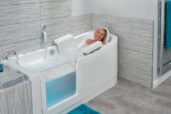The government recently announced an extra £250m of funding to speed up the discharge of medically fit patients from hospital. The money will pay for extra beds in care homes to try and free up some of the 13,000 hospital beds that are currently occupied by patients who can’t be discharged due to a lack of suitable care facilities.
The problem of patients who are not ready to return home but could be cared for in another setting outside of hospital has added to the pressures on the NHS this winter. A lack of investment in community care settings over the past decade has resulted in a chronic shortage of places for patients who have been passed as medically fit for discharge.
Health Secretary Steven Barclay said:
“I am taking urgent action to reduce pressure on the health service, including investing an additional £200 million to enable the NHS to immediately buy up beds in the community to safely discharge thousands of patients from hospital and free up hospital capacity, on top of the £500 million we’ve already invested to tackle this issue.”
However, the charity Carers UK, which supports the rights of unpaid carers, responded by commenting that there needs to be an equivalent investment in domiciliary care to help carers and those who want to be cared for in their own homes.
Helen Walker, Chief Executive of Carers UK, said:
“We recognise the pressing need to discharge fit patients from hospital, but as well as funding care homes and other settings to take patients, it is imperative that there is also sufficient investment in domiciliary care so that patients who can receive care at home – whether that be from a care worker or family member, or both – get the adequate support they need.
She added: “It is absolutely vital that unpaid carers are involved in the hospital discharge process – as is their hard won recent legal right.”
Where a care setting is identified as the right place for a patient to be discharged in the short-term, it is important that a plan is developed between the hospital, carer and care setting, to ensure that when the patient is fit to return home they and the person caring for them have the right practical support in place.”
“Our State of Caring 2022 research has shown a worrying lack of involvement and support – 43% of carers disagreed that they had been involved in the decisions about discharge and the care and treatment needed.”
Ms Walker also pointed out that without sufficient discussion and support of how a family member or friend could be looked after at home, it increased the likelihood of the patient returning to hospital in the near future.
Some home alterations and adaptations, such as a disabled walk in shower, can enable carers and their loved ones to more easily and safely continue to live independently and delay the need to go into residential care or hospital.
If you are interested in finding out more information call us on 01491 411041 or visit our website.
11 February,2023









